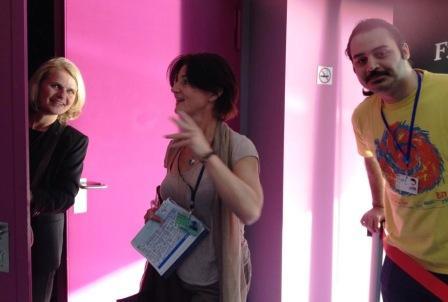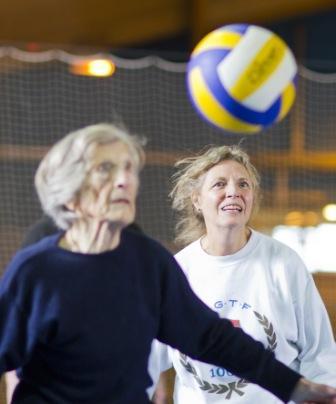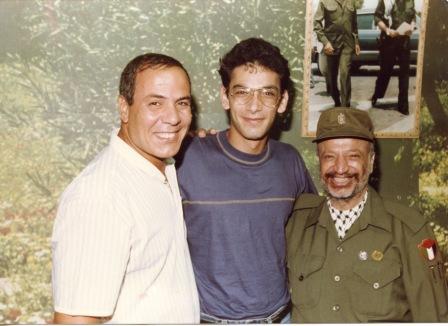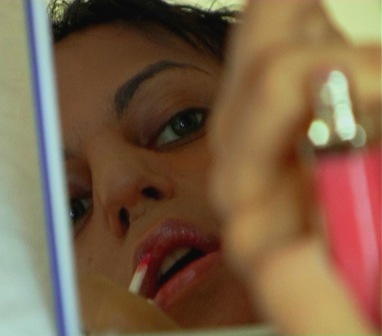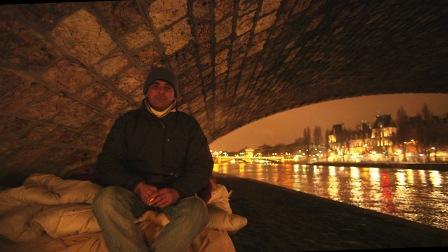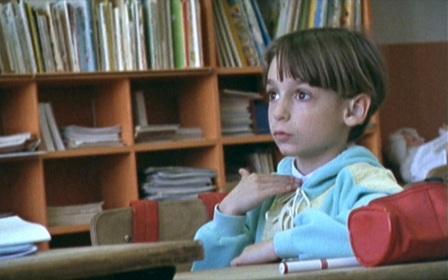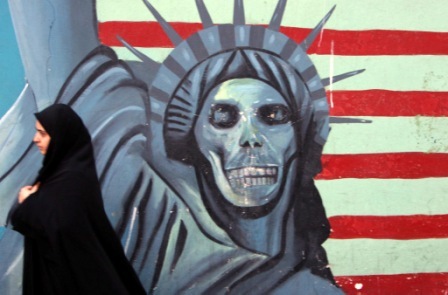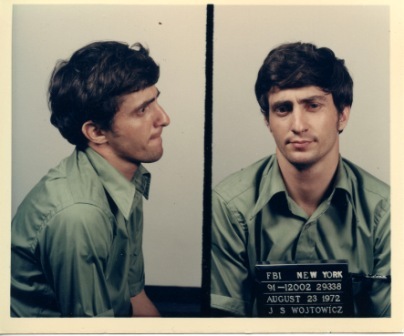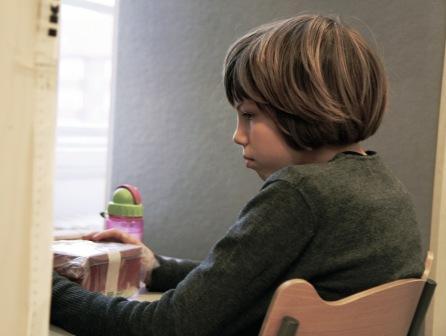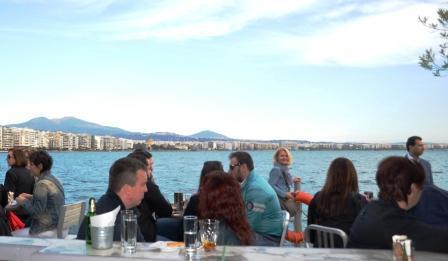"Everyone should have a chance to do this," exclaimed my sister Katy Frissora, speaking about our week together at the recent Thessaloniki Documentary Film Festival in Greece. "See documentaries from all over the world and talk to the directors afterwards. It makes you think. Plus, the Greeks are so wonderful!"
The Thessaloníki Documentary Film festival features 191 films on subjects as varied as nuclear waste control in Switzerland (Journey to the Safest Place on Earth) to Donald Rumsfeld (Erroll Morris' The Unknown Known). It is also lively with social encounters, from tours to Roman ruins to "Just Talking" encounters with the directors.
The first documentary my sister and I saw, in honor of the sisters' theme, was American Commune, about two sisters who return for the first time in twenty years to the commune they grew up in in Tennessee. The film begins as a personal journey from New York City, with the hip sisters putting on make-up in the van ("a no-no in the commune world"), to arrive at a lush clearing in a forest, where rusted caravans bear witness to the journey made many years before in 1970 by guru Stephen Gaskin and 1500 hippies. Co-director Nadine Mundo, speaking to the mostly Greek audience after the screening, explained that one reason she made this film is that in the United States, "hippies have a bad reputation."
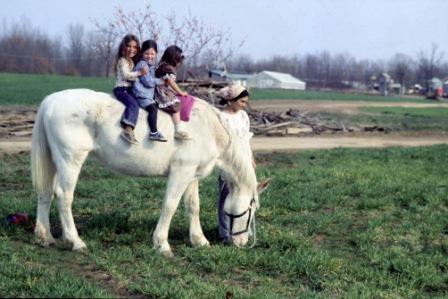
Her film shows the opposite: many photos of happy children playing, impressive farming techniques, humanitarian relief programs set up in countries around the world, and avant-garde methods of child-birth ("Spiritual Midwifery") , all to the lively soundtrack composed by Jeffery Alan Jones. "Walking to school in the woods was an adventure!" says one former child-hippie blissfully, during the Commune's first reunion. The upbeat film interweaves these images of an idyllic childhood with rockier stories of the sisters' own trajectory, which includes their parents' divorce and subsequent abandonment of the commune. While the film offers us a chance to peep into footage of the bygone hippie spirit, it is also a means for the directors to come to terms with their alternative identity.
The importance of community -- and identity -- seemed central to many of the films at the festival. Some films, like the Norwegian film The Optimists, show how much joy people get from being on a team; in this case, octogenarian women who play volleyball together, energetically running up and down the court. "There's a penalty for 'crunching' the ball," says one of the lively members, explaining how volleyball is all about "teamwork." Another film, American Dreamer, follows a lonely trailer-home Floridian who finds his greatest happiness in joining demonstrators in front of the 9/11 memorial, taking the bus up north every year to do so. "I am a patriot!" Julian happily croons.
The whole concept of "identity" explodes, however, in Nudit Ledar and Yaron Shani's Life Sentences. The story of the son of an Arab terrorist and a Jewish woman in Israel, it features the young man discussing, with anguish, what it means to never fit in anywhere. After his mother learns of the father's 22 attacks on Jewish sites, she divorces him and puts her two children in a Jewish orphanage. The two are ostracized by the other Jewish students. Eight years later the mother rescues the now withdrawn children and valiantly brings them to Canada, where the children once again go through an identity shift: to Orthodox Judaism and Yeshiva school. The boy maintains throughout that he does not believe in any religion: "The only religion there should be is Empathy," he states. Meanwhile his sister nurtures a secret rapport with her Arab father, now released from prison and part of the PLO. The saga reverses when the daughter becomes an Orthodox Jew with eight children and the young man switches to.....
"The whole story was so improbable that when my partner approached me with this project, thinking to do it as a fiction, I thought as a fiction it would come off as unbelievable melodrama!" said director Yaron Shani (renowned for his acclaimed fiction film Ajami), later as we walked along the port together. Shani explained that for him, this film shows that whatever we take for granted in our identity are "agents of oppression."
Its message apart, what makes his film one of the best I saw is the riveting concentration on the young man's face -- traumatized by rejection -- as well as the ease in shifts between footage, interviews and photos of the family members in transition. We feel the boy's pain as identity-lines (religion and ideology) break his relations and leave him, over and over again, alone. "You search for someone who feels like you and you don't find that person."
There is a happy ending, however.
The need to be accepted and loved was a central issue in another Israeli documentary, The Good Son, about 22-year-old Or who goes off to Thailand to have a transgender operation, without his family's knowledge, and transforms from an unhappy moping boy, barely articulate, to a laughing vibrant girl who loves her new haircut and dress. But when Or goes back home to surprise his brother, mother and father with his new identity as a pretty girl, he is as thrilled by his changed gender as anxious about their reception. He needs his mother and father's hug. "It made me cry," said one Greek journalist stopping to speak to me on the pier. "When the mother tells the son, 'you are my baby. I will always love you.'" Later, a Berlin film director, Nana Rebhan, shared a coffee with me at my breakfast table, and with tears her eyes, she related the same touching scene. "Although," she laughed. "The father is not so happy. He asks his son 'please can you change back into a man?'"
Another common theme: the invincible ability of people to maintain their dignity, no matter what conditions. One of the films most appreciated by Jury members was Claus Drexel's On the Edge of the World, featuring candid interviews with the homeless in Paris. Beautifully shot, the subjects speak from their "homes" -- a make-shift camp on a quay or the marble tunnel of the Louvre -- as the Tour Eiffel glitters in the distance. "The hardest part is the lack of privacy," says one energetic man, as he pets his kitten. "Imagine what you would feel if drunken twenty year olds coming back from nightclubs jeer at you as you sleep?" "No one ever asks the cause for why we are homeless," says another woman. "And without speaking about causes, they just chalk you up as hopeless. But we are people with hope as well."
A similarly compelling film, The Land of the Deaf , offered a view into the dignity of the deaf community, by following deaf individuals in their everyday life: school, marriage, looking for an apartment. All stereotypes about "handicap" are broken as we watch them happily communicate. The film begins with a deaf would-be actor, who explains, with great theatricality, how disappointed he was when he was told by a neighboring film director he could never be an actor. "But I can act, and they can dub me!" the man says incredulously.
Nicolas Philibert, the acclaimed French documentarist, honored this year at the festival with a retrospective tribute, spoke about his 1998 film: "When I first met my subjects, I did not go with an interpreter," the director, a kind man in his sixties, explained. "I wanted to communicate directly, even though I knew a minimum of sign language." He also noted that through the filming, he learned how "full of joy and energy" the world of the deaf is. One of the most charismatic subjects in the film -- a talented teacher whose classes are wonders of theatrical expression -- spoke about his feelings when he learns that his own child is a hearing child. "I was devastated, of course, but I love her all the same."
And then of course there are the entertaining films, among which I would include Man in Tehran, which offers a documentary view of the events of the 1979 hostage crisis in Iran, replete with interviews with the hostages and the Canadian ambassador (Ken Taylor) who masterminded the escape of six of them. The film captures the air of excitement and suspense of "Operation Eagle Claw" with a sprinkling of political analysis, including a critique of the undeserved flack Carter got for his failure to liberate the hostages during his term of office. One wishes more on this angle. "We actually did try to get an interview with Carter," the co-director Drew Taylor confided over breakfast. "He agreed, but was so busy with lectures all over the world, we could not schedule it in." Asked his particular slant on the film, which seems a celebration of political bravado, Taylor noted: "What we were interested in about this story is that two countries were able to work closely together, that Canada was willing to help the United States."
Another fun documentary to watch was The Dog, about the true story behind Sidney Lumet's Dog Day Afternoon: featuring the man John Wojtowicz who robbed a Brooklyn bank to pay for his lover's sex-change operation. John is so charismatic--exuberant with humor--that we can understand how he convinced two youngsters to join him in his madly conceived heist, preceded by a night of wild sex. Sitting in his hangout, a park at the crossroads of Christopher Street and 7th Avenue, the man exclaims about his love of "fucking". "Live your life like it's your last," he enthuses. Consistent to the end, despite his lengthy prison sentence and subsequent cancer, in the closing scene the now gaunt man promises a seal in a zoo a blow job if he swims close.
Still it is unclear, at least at first, whether the directors are celebrating this lively captivating character -- or pointing to how disturbed he is, lacking moral conscience for the death and terror he caused and seeming to float in a bubble of madness, except for his strong bond to his mother. Co-director Alison Berg admitted that it "is not a balanced film." She explained that she just wanted the "dog to tell his story". She also noted that the film project began as oddly as the story told: with a phone call at two in the morning, with the directors and Wojtowicz speaking until dawn. "When we first met, he pinched my co-director in the butt."
On a more serious note: We have the devastating short film about children in Mexico who tried to commit suicide -- Nuria Ibanez' The Naked Room. One interview after another reveals lonely self-hating girls and boys, who are little supported by their parents and hardly able to express their pain. A testimony to human fragility--showing how those most fragile can sink to the bottom -- the film is difficult to watch. I could not see it to the end.
The audience at the festival showed a similar investment in seeing hope for children. They chose, as the winning film (just as they did the year before), a story about how people can make an effort and inspire a difference in children's lives. Last year's winner was about an American who goes to India to work with children with HIV. This year's FOUR LETTERS APART- Children in the Age of ADHD concerns the attempts by pedagogues and social workers in Denmark to help children diagnosed with "ADHD", a diagnosis that they find useless. The camera follows with incredible intimacy three children--Marino, Martine and Victor---as the pedagogues embark on a six month experiment to take them off of Ritalin and other drugs, and help each child with his or her individual emotional and physical issues. Unruly and obnoxious at first, the children steadily improve. A key factor seems to be the ability to express one's innermost feelings, and feel heard: perhaps a key theme throughout all the documentaries. One boy who used to punch out his mates in the schoolyard now apologizes for his misbehavior, and has friends.

